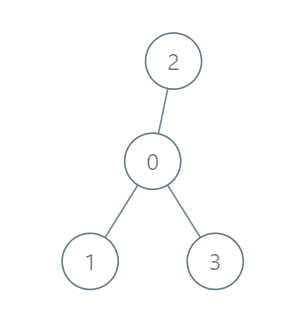| comments | difficulty | edit_url | rating | source | tags | ||||
|---|---|---|---|---|---|---|---|---|---|
true |
Medium |
2011 |
Weekly Contest 320 Q3 |
|
There is a tree (i.e., a connected, undirected graph with no cycles) structure country network consisting of n cities numbered from 0 to n - 1 and exactly n - 1 roads. The capital city is city 0. You are given a 2D integer array roads where roads[i] = [ai, bi] denotes that there exists a bidirectional road connecting cities ai and bi.
There is a meeting for the representatives of each city. The meeting is in the capital city.
There is a car in each city. You are given an integer seats that indicates the number of seats in each car.
A representative can use the car in their city to travel or change the car and ride with another representative. The cost of traveling between two cities is one liter of fuel.
Return the minimum number of liters of fuel to reach the capital city.
Example 1:
Input: roads = [[0,1],[0,2],[0,3]], seats = 5 Output: 3 Explanation: - Representative1 goes directly to the capital with 1 liter of fuel. - Representative2 goes directly to the capital with 1 liter of fuel. - Representative3 goes directly to the capital with 1 liter of fuel. It costs 3 liters of fuel at minimum. It can be proven that 3 is the minimum number of liters of fuel needed.
Example 2:
Input: roads = [[3,1],[3,2],[1,0],[0,4],[0,5],[4,6]], seats = 2 Output: 7 Explanation: - Representative2 goes directly to city 3 with 1 liter of fuel. - Representative2 and representative3 go together to city 1 with 1 liter of fuel. - Representative2 and representative3 go together to the capital with 1 liter of fuel. - Representative1 goes directly to the capital with 1 liter of fuel. - Representative5 goes directly to the capital with 1 liter of fuel. - Representative6 goes directly to city 4 with 1 liter of fuel. - Representative4 and representative6 go together to the capital with 1 liter of fuel. It costs 7 liters of fuel at minimum. It can be proven that 7 is the minimum number of liters of fuel needed.
Example 3:
Input: roads = [], seats = 1 Output: 0 Explanation: No representatives need to travel to the capital city.
Constraints:
1 <= n <= 105roads.length == n - 1roads[i].length == 20 <= ai, bi < nai != biroadsrepresents a valid tree.1 <= seats <= 105
According to the problem description, we can find that all cars will only drive towards the capital (node
Suppose there is a node
We start a depth-first search from node
The time complexity is
class Solution:
def minimumFuelCost(self, roads: List[List[int]], seats: int) -> int:
def dfs(a: int, fa: int) -> int:
nonlocal ans
sz = 1
for b in g[a]:
if b != fa:
t = dfs(b, a)
ans += ceil(t / seats)
sz += t
return sz
g = defaultdict(list)
for a, b in roads:
g[a].append(b)
g[b].append(a)
ans = 0
dfs(0, -1)
return ansclass Solution {
private List<Integer>[] g;
private int seats;
private long ans;
public long minimumFuelCost(int[][] roads, int seats) {
int n = roads.length + 1;
g = new List[n];
Arrays.setAll(g, k -> new ArrayList<>());
this.seats = seats;
for (var e : roads) {
int a = e[0], b = e[1];
g[a].add(b);
g[b].add(a);
}
dfs(0, -1);
return ans;
}
private int dfs(int a, int fa) {
int sz = 1;
for (int b : g[a]) {
if (b != fa) {
int t = dfs(b, a);
ans += (t + seats - 1) / seats;
sz += t;
}
}
return sz;
}
}class Solution {
public:
long long minimumFuelCost(vector<vector<int>>& roads, int seats) {
int n = roads.size() + 1;
vector<int> g[n];
for (auto& e : roads) {
int a = e[0], b = e[1];
g[a].emplace_back(b);
g[b].emplace_back(a);
}
long long ans = 0;
function<int(int, int)> dfs = [&](int a, int fa) {
int sz = 1;
for (int b : g[a]) {
if (b != fa) {
int t = dfs(b, a);
ans += (t + seats - 1) / seats;
sz += t;
}
}
return sz;
};
dfs(0, -1);
return ans;
}
};func minimumFuelCost(roads [][]int, seats int) (ans int64) {
n := len(roads) + 1
g := make([][]int, n)
for _, e := range roads {
a, b := e[0], e[1]
g[a] = append(g[a], b)
g[b] = append(g[b], a)
}
var dfs func(int, int) int
dfs = func(a, fa int) int {
sz := 1
for _, b := range g[a] {
if b != fa {
t := dfs(b, a)
ans += int64((t + seats - 1) / seats)
sz += t
}
}
return sz
}
dfs(0, -1)
return
}function minimumFuelCost(roads: number[][], seats: number): number {
const n = roads.length + 1;
const g: number[][] = Array.from({ length: n }, () => []);
for (const [a, b] of roads) {
g[a].push(b);
g[b].push(a);
}
let ans = 0;
const dfs = (a: number, fa: number): number => {
let sz = 1;
for (const b of g[a]) {
if (b !== fa) {
const t = dfs(b, a);
ans += Math.ceil(t / seats);
sz += t;
}
}
return sz;
};
dfs(0, -1);
return ans;
}impl Solution {
pub fn minimum_fuel_cost(roads: Vec<Vec<i32>>, seats: i32) -> i64 {
let n = roads.len() + 1;
let mut g: Vec<Vec<usize>> = vec![vec![]; n];
for road in roads.iter() {
let a = road[0] as usize;
let b = road[1] as usize;
g[a].push(b);
g[b].push(a);
}
let mut ans = 0;
fn dfs(a: usize, fa: i32, g: &Vec<Vec<usize>>, ans: &mut i64, seats: i32) -> i32 {
let mut sz = 1;
for &b in g[a].iter() {
if (b as i32) != fa {
let t = dfs(b, a as i32, g, ans, seats);
*ans += ((t + seats - 1) / seats) as i64;
sz += t;
}
}
sz
}
dfs(0, -1, &g, &mut ans, seats);
ans
}
}

